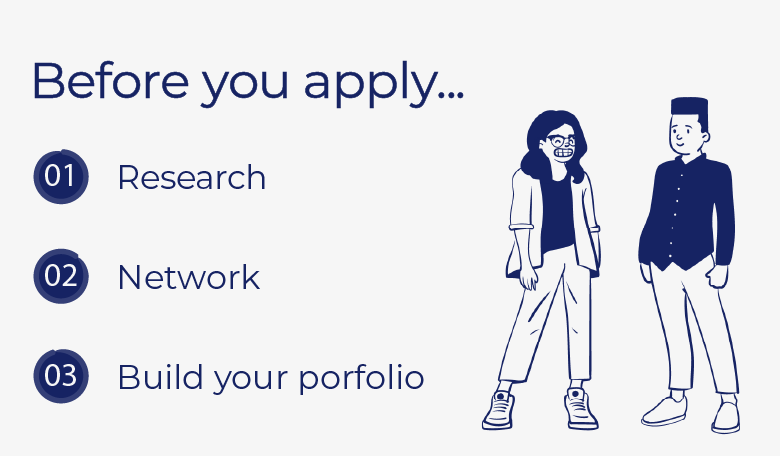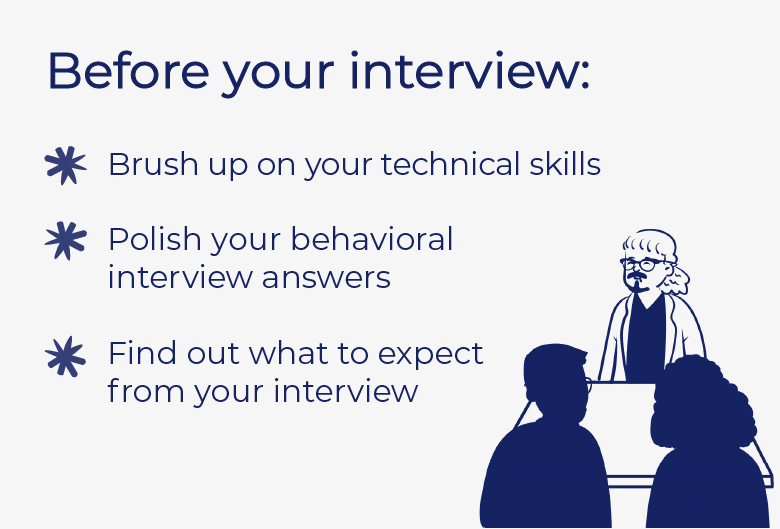How to Score a Data Science Internship
This lucrative field is highly sought after. Do you have what it takes to land an internship in data science?
While the term data science was originally coined in 2001, the field has gained popularity in the United States significantly over the past few years. An October 2012 issue of the Harvard Business Review called the data scientist role the Sexiest Job of the 21st Century, and it earned the #3 spot on Glassdoor’s 50 Best Jobs in America 2020. Despite the increased demand for data scientists, the position’s notoriously high salaries and cushy benefits attract a talented pool of candidates. To make yourself stand out, it’s a good idea to start with a co-op or summer internship to gain work experience before you’re ready to move to full-time. Here’s what you have to know about data science internships and how to land one.
What qualifications do I need to be a data science intern?

"Data Science" can mean many things
The data scientist position may vary from company to company, so it’s best to read each job description carefully. Although the field of data science will allow you to explore some interesting topics like big data, deep learning, and computer vision, you’ll likely spend your summer working on smaller projects with more immediate real-world applications.
A DoorDash data scientist published a blog post where he detailed the various projects that the data scientist internship program may entail-- some may have you experiment with machine learning models, some may involve using Tableau to generate data visualization, and others may ask you to act as a software engineer by building and maintaining databases for others to interact with.
There is no ideal major
Because of the diversity of the title, data scientists can come from a variety of backgrounds. One data science recruiter on Quora said the main traits he looks for are technical knowledge, intellectual curiosity, problem solving skills, and the ability to be multidisciplinary.
“If you have those traits, aren't scared of math and eager to learn, then I do not care what your bachelor's degree is in,” he said.
While some universities do offer a data science major, many say that physics, statistics, computer science, or any social science with a heavy data analysis or quantitative focus is good preparation.
Enter competitions to boost your chances
Outside of academics, there’s plenty of other measures you can take to increase your chances of landing a data science internship. Some suggest entering online competitions to practice your skills and potentially gain prestigious rankings to add to your resume.
Kaggle, an online data scientist community and subsidiary of Google, allows users to access data sets and solve challenges posted by companies to win prizes and rankings. Awards aren’t easy to come by, as competition can be stiff. “Most people who are Grandmasters, like winning a competition, are hardcore data scientists and researchers and it takes a lot of effort and creativity to win one,” said one Quora user. Therefore, an impressive ranking can add some credibility to your resume.
How do I find the right opportunity?

Utilize job boards
Once you feel prepared to apply for a data science position, the next step is to find job postings. Allen Blue, co-founder of LinkedIn, once said,
“Data scientists are almost all already employed… There are no data scientists out there passing out their résumés, or very few, because they’re so in demand.”
However, despite the abundance of data science jobs and shortage of workers to fill them, it can still be hard for college students and new graduates to find positions. Luckily, there are plenty of websites to help you with your search, including general job boards like Glassdoor, LinkedIn, and ZipRecruiter, as well as more tech-specific websites like ai-jobs.net or AngelList. If you’re looking to work in a big city like San Francisco or Chicago, you can also try BuiltIn. One startup CEO even recommended searching for data science companies on Crunchbase and cold-emailing the addresses provided.
Check out the rankings
You also look at online ranking lists to find relevant companies in the industry. BuiltIn released a list of data science companies you should know that featured world-class organizations like Numerator, Cloudera, Mu Sigma, and Oracle, among others. Some industry experts also recommend checking out big tech companies that don’t necessarily specialize in data science, such as Google, Yahoo, Apple, and eBay.
Reach out to your network
As in any industry, it never hurts to turn to your network when looking for a data science internship. Laura Niss, currently a PhD candidate at the University of Michigan, worked as a data science intern at the adaptive learning company Knewton in New York in 2018.
“I went the total networking route,” she said. “One of my friends who had the same advisor as me had the internship the year before. So I had direct contact with the recruiter, and they very quickly set up an interview with me.”
Her friend had found the internship the previous summer by cold-calling companies he found online.
“It’s hard to know what exists, but look at random places on the internet, ask [other] people for places that you haven’t heard of,” Niss advised.
Before you apply, build your portfolio
Before you start to apply to any internships, it’s a good idea to beef up your digital portfolio. A data scientist at Analytics Vidhya said that you’ll maximize your odds by working on personal projects, building up your GitHub profile, writing blog posts, and updating your LinkedIn. However, if you’re in a time crunch, focus on uploading all the projects you’ve worked on to GitHub or a personal website, and expand your LinkedIn network by connecting with other data scientists.
👉 Company size makes a huge difference in your experience. Learn more here.
How do I prepare for the interview?

Brush up on technical skills
Once you have an interview locked down, it’s time to brush up on your technical skills. For most positions, you’ll need to be familiar with languages like Python, R, and SQL, all of which you can practice on websites like HackerRank. It can also help to know how to use data analytics tools and frameworks like Google Analytics and Apache Spark. You can find plenty of online interview prep on websites like Springboard or DataCamp, and you can look for company-specific questions from other candidates’ interviews on Candor.
Show off your soft skills
In addition to mastering statistical knowledge and programming skills, it’s important to be able to showcase your soft skills. Do some research to learn as much as you can about the company. Make sure you’re able to communicate your strengths and how they make you a good fit for the culture and mission. Ask insightful questions about the program and how it can help advance your career goals.
Some previous candidates even argue that personality and communication skills can be more important than technical expertise. One Reddit user said, “I’ve had interviews where I crushed the technical screens, and even got commended for it, but still got passed over presumably because my personality didn’t fit well with their culture.”
Understand the interview process
Niss’s interview process for Knewton consisted of three steps. First, she had an initial phone screening, where she talked about the company, shared some details on her background, and answered some stats-related questions. Then she had a data science challenge, where they gave her a vague prompt and a set of data and asked her to come to a conclusion. Lastly, she completed a virtual final round interview with the data science team that ran about three to four hours and consisted of a technical coding interview, a technical statistical interview, and a general conversation about the company. In a blog post she wrote about her experience, she said,
“I spent a lot of time preparing for the programming portion, and no time preparing for the stats portion. I recommend not doing that.”
Keep in mind that every interview process looks different. Before speaking with a company, make sure you know what to expect.
👉 Read Next: Entry Level Data Science Jobs-- the lay of the land
The information provided herein is for general informational purposes only and is not intended to provide tax, legal, or investment advice and should not be construed as an offer to sell, a solicitation of an offer to buy, or a recommendation of any security by Candor, its employees and affiliates, or any third-party. Any expressions of opinion or assumptions are for illustrative purposes only and are subject to change without notice. Past performance is not a guarantee of future results and the opinions presented herein should not be viewed as an indicator of future performance. Investing in securities involves risk. Loss of principal is possible.
Third-party data has been obtained from sources we believe to be reliable; however, its accuracy, completeness, or reliability cannot be guaranteed. Candor does not receive compensation to promote or discuss any particular Company; however, Candor, its employees and affiliates, and/or its clients may hold positions in securities of the Companies discussed.
